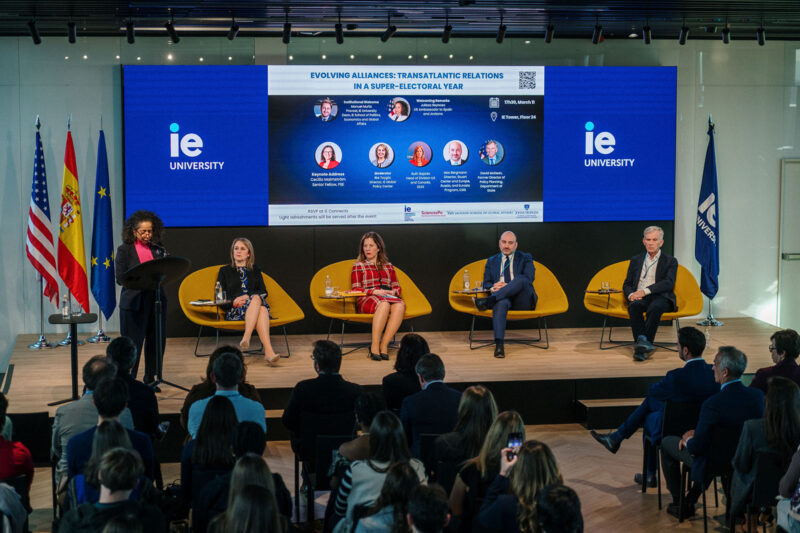The Transatlantic Bridge Strategic Foresight Workshop was jointly organized by the Jackson School, IE School of Politics, Economics & Global Affairs, School of Advanced International Studies at Johns Hopkins, and the Paris School of International Affairs at Sciences Po.
On March 11 and 12, IE University hosted the 2024 edition of the Transatlantic Bridge Strategic Foresight Workshop at its campus in Madrid. The workshop was jointly organized by the IE School of Politics, Economics & Global Affairs, the Jackson School of Global Affairs at Yale University, the School of Advanced International Studies at Johns Hopkins (SAIS), and the Paris School of International Affairs at Sciences Po (PSIA).
Following the success of the Transatlantic Conference 2023, the Foresight Workshop has become a crucial component of the Transatlantic Bridge alliance, an initiative that brings together four prestigious academic institutions in the pursuit of rigorous analysis and policy recommendations on transatlantic affairs.
The workshop, which included a distinguished audience of personalities and experts from both European and North American spheres, was opened by Manuel Muñiz, provost of IE University and dean of IE School of Politics, Economics & Global Affairs, H.E. Julissa Reynoso, the United States ambassador to Spain and Andorra, and special guest Cecilia Malmström, former European Commissioner for Trade and Home Affairs. The speakers emphasized the importance of building bridges for dialogue and transatlantic collaboration in times of uncertainty and technological change.
A panel on “Evolving Alliances: Transatlantic Relations in a Super-Electoral Year,” followed the opening session. It featured experts such as Ruth Bajada from the European External Action Service (EEAS), Max Bergmann from the Center for Strategic and International Studies (CSIS), and David McKean, former U.S. ambassador to Luxembourg. Ilke Toygür, director of the Global Policy Center at IE School of Politics, Economics, and Global Affairs, moderated the conversation.
“We are entering a moment of big change in the relationship. Electoral periods are periods of adjustment and change. We need to be ready for what is to come and guarantee that fundamental elements of the transatlantic relationship are kept in place and thriving,” said Toygür.
Other sessions engaged scholars from the four partner schools, as well as experts and policymakers, on an analysis of the potential impact of the 2024 elections in the United States and the European Parliament. These sessions included a foresight exercise, where four crucial policy areas were addressed: Foreign Policy, Security, and Defense; Environment, Energy, and Industrial Policy; Trade, Technology, and Innovation; and Democracy, Human Rights, and Rule of Law.
The workshop concluded with final reflections focused on laying the groundwork for future actions and collaborations in transatlantic relations.
“The workshop provided a useful opportunity to reflect on the deepening uncertainties facing the trans-Atlantic relationship and think critically about countermeasures that policy makers in Europe and the United States could and perhaps should take in coming months to mitigate against the growing number of increasingly sobering scenarios that threaten the existing international order,” said Sergey Radchenko, Wilson E. Schmidt Distinguished Professor at SAIS Europe.
“The coming elections on both sides of the Atlantic should not make us forget that, beyond politics, both the values we have in common as the adversaries who target us lead to a shared destiny,” said Marnix Amand, senior lecturer at the Yale Jackson School of Global Affairs.
“By consolidating a common understanding of global challenges such as the emergence of AI and other technologies, the academic and scientific community can help identify solutions. In today’s volatile geopolitical environment we have a shared responsibility in ensuring innovation supports democracy and peace,” said Constance de Leusse, executive director of the Tech and Global Affairs Innovation Hub, Paris School of International Affairs (PSIA), Sciences Po.
The primary outcome of this workshop will be the publication of a report comprising four policy papers proposing specific recommendations in the aforementioned areas to key EU and U.S. institutions.
This report will serve as the thematic backbone of the Transatlantic Conference 2024 to be held in Bologna, Italy, from June 14 to 16, 2024.
